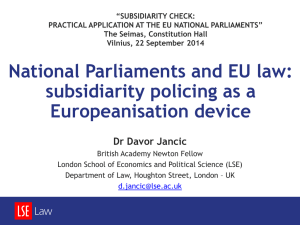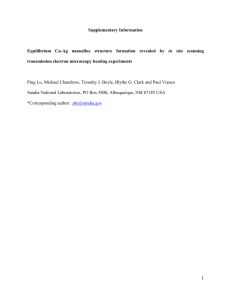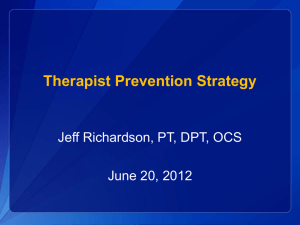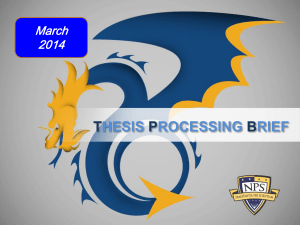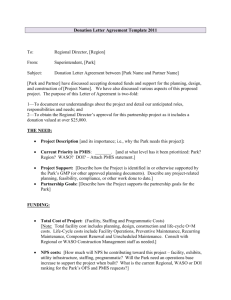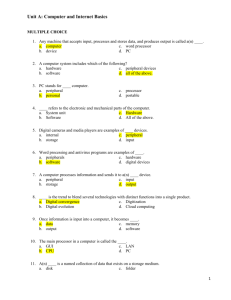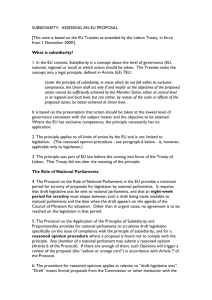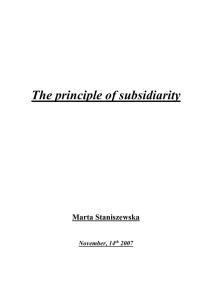Newsletter #30
advertisement
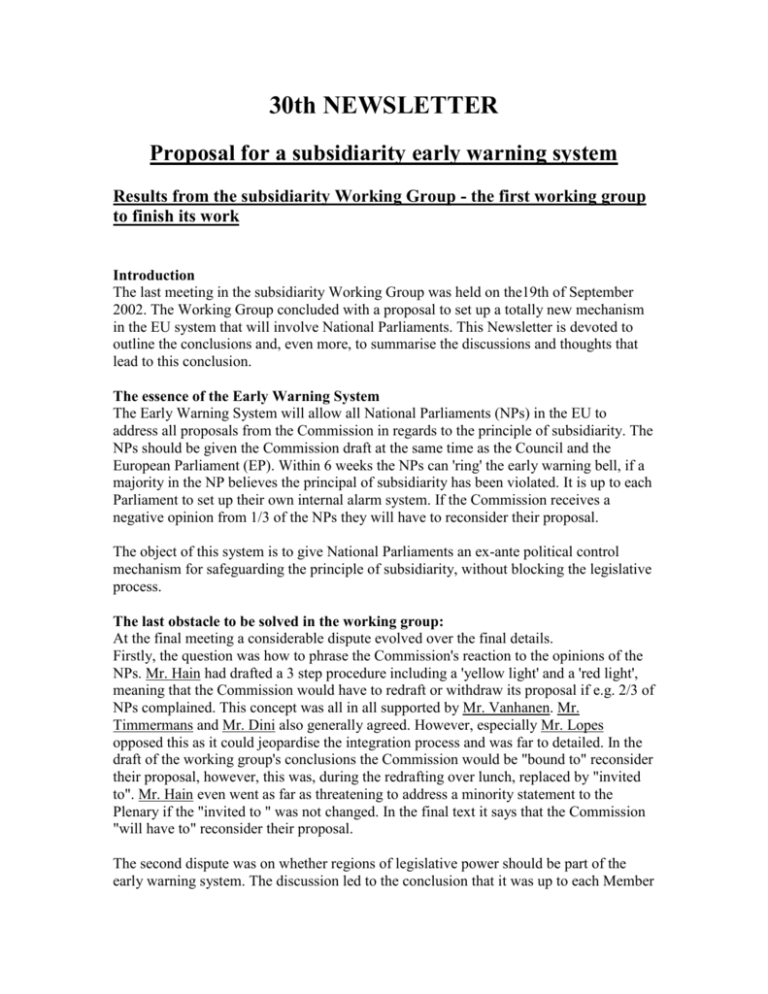
30th NEWSLETTER Proposal for a subsidiarity early warning system Results from the subsidiarity Working Group - the first working group to finish its work Introduction The last meeting in the subsidiarity Working Group was held on the19th of September 2002. The Working Group concluded with a proposal to set up a totally new mechanism in the EU system that will involve National Parliaments. This Newsletter is devoted to outline the conclusions and, even more, to summarise the discussions and thoughts that lead to this conclusion. The essence of the Early Warning System The Early Warning System will allow all National Parliaments (NPs) in the EU to address all proposals from the Commission in regards to the principle of subsidiarity. The NPs should be given the Commission draft at the same time as the Council and the European Parliament (EP). Within 6 weeks the NPs can 'ring' the early warning bell, if a majority in the NP believes the principal of subsidiarity has been violated. It is up to each Parliament to set up their own internal alarm system. If the Commission receives a negative opinion from 1/3 of the NPs they will have to reconsider their proposal. The object of this system is to give National Parliaments an ex-ante political control mechanism for safeguarding the principle of subsidiarity, without blocking the legislative process. The last obstacle to be solved in the working group: At the final meeting a considerable dispute evolved over the final details. Firstly, the question was how to phrase the Commission's reaction to the opinions of the NPs. Mr. Hain had drafted a 3 step procedure including a 'yellow light' and a 'red light', meaning that the Commission would have to redraft or withdraw its proposal if e.g. 2/3 of NPs complained. This concept was all in all supported by Mr. Vanhanen. Mr. Timmermans and Mr. Dini also generally agreed. However, especially Mr. Lopes opposed this as it could jeopardise the integration process and was far to detailed. In the draft of the working group's conclusions the Commission would be "bound to" reconsider their proposal, however, this was, during the redrafting over lunch, replaced by "invited to". Mr. Hain even went as far as threatening to address a minority statement to the Plenary if the "invited to " was not changed. In the final text it says that the Commission "will have to" reconsider their proposal. The second dispute was on whether regions of legislative power should be part of the early warning system. The discussion led to the conclusion that it was up to each Member State to organise it's internal system and how they might include regions, moreover, the regions have the Committee of the Region to address their concerns. Mr. Brok wanted to be sure that a minority in a NP could not send forward their opinion to the Commission, referring to the German system on governments. However, many speakers thought it would be a violation of the principle of subsidiarity itself if Brussels were to tell NPs how to organise their own work. In document WG19 the NPs were to have submitted the Commission's annual legislative program. However, in the same paragraph it was suggested that NPs should discuss this program in a body yet to be determined. Yet, as no one wants to set up a new EU institution the whole paragraph was deleted in the next text version. Mr. Bonde, though, had argued for an even stronger mandate for the NPs on the Commission's legislative program. Juridical control Moreover, the European Court of Justice's (ECJ) role in ex-post control of the principle of subsidiarity should be reinforced by giving the NPs the right to refer to the ECJ on matters of violation of subsidiarity. The ECJ ex-post control should thus be enforced. In many of the working groups meetings an ex-post juridical control was advocated for by i.e. Mr. Brok and Mr Teufel. However, Mr. Mendes de Vigo, and many others argued that the nature of the principle of subsidiarity is a political matter, and the ECJ itself has in its intervention to the working group expressed resistance with this politically sensitive area. Some members wanted regions to have the right to refer to the ECJ, at least the regions with legislative power. The previous discussions In the first working group meeting in the beginning of July, it was quickly acknowledged that NPs should be involved in the principle of subsidiarity, as they are in a key position, in regard to the so called democratic deficit. It was discussed preliminary whether NPs could meet and discuss matters of subsidiarity for example in the structure of COSAC. However, despite good intentions, the danger of creating new Brussels institutions, more complications, bureaucracy and prolonging of the legislative process, the idea was refused. Mr. Hein, Mr. Timmermans and Mr. Bonde still regarded an ad hoc body of representatives from the NPs to be future consideration. There has also been a long discussion on whether the monitoring of the subsidiarity should be focused on ex-ante vs. ex-post and whether this should be done by juridical or political institutions. Mr. Severin pointed out that most logically it is juridical control to be asked for if there is a political dispute between NPs and the Commission or NPs and the Council or European Parliament. This even lead to a discussion on reconciliation mechanism. Concluding remarks Mendes de Vigo expressed his satisfaction with the working group's ability to come up with innovative ideas towards a common proposal for the plenary. He was also pleased with the positive comments and interest from other members of the Convention, when he presented the working groups ideas at the plenary session the 12th and 13th of September. He was pleased with the early warning system, as it is perceived as a radical new feature of the EU, which allows NPs to be directly involved in EU affairs. Giscard d'Estaing was also pleased with the working group's ability to address a real problem and that it was able to come up with a proposal for a solution. The Presidium, however, did not want a conclusion with minority statements from the working group.
